How You Can Help Chimpanzees After Watching 'Chimp Crazy'
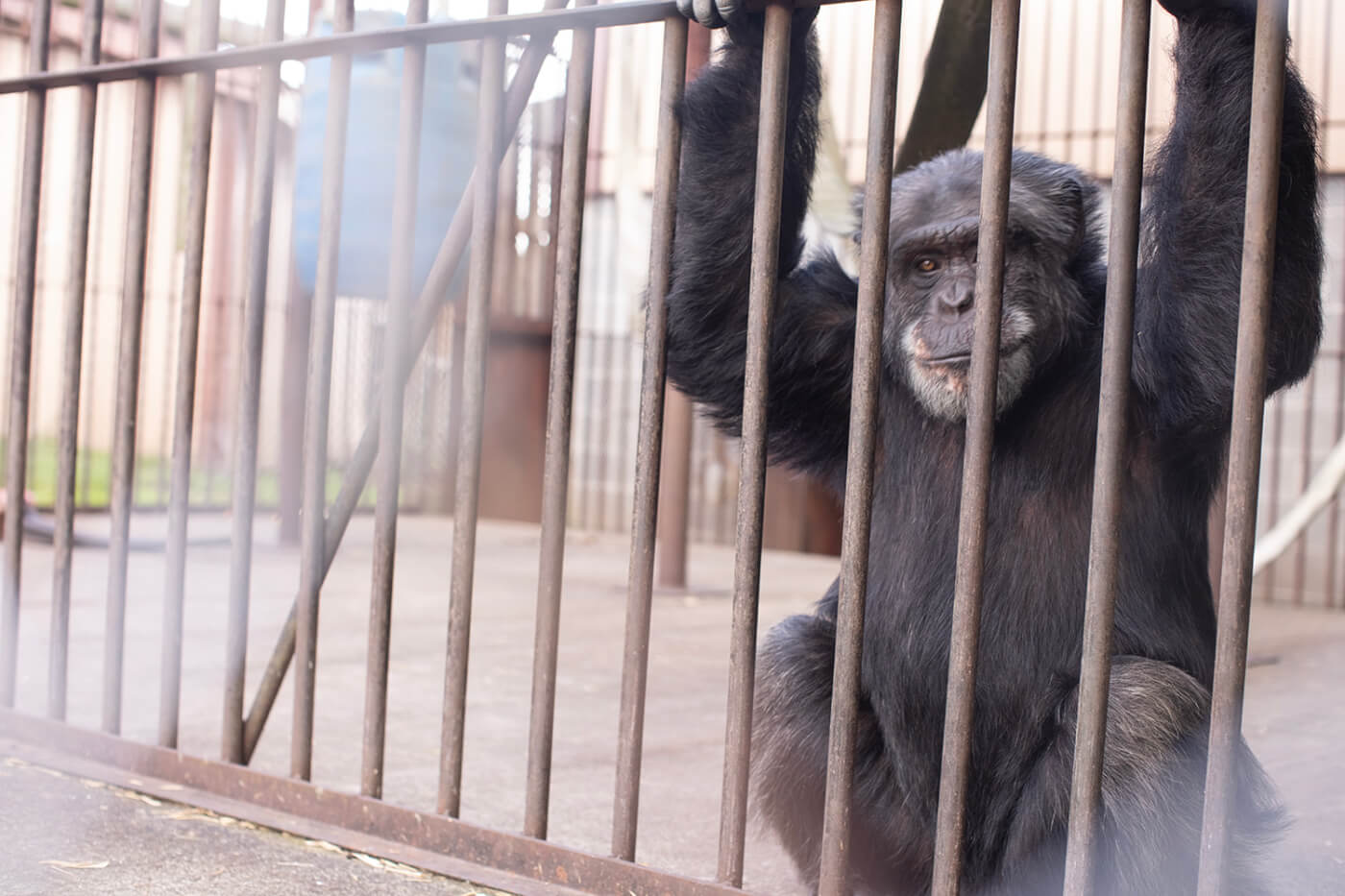
HBO’s docuseries Chimp Crazy shines a light on the seedy underworld of misguided humans who force chimpanzees to live in their homes and exploit them for entertainment.
In nature, chimpanzees spend the first several years of their lives nursing and clinging to their mother’s side. But selfish, unscrupulous breeders have torn these primates away from their mothers when they were just months, weeks, or even days old in order to sell them as “pets” or use them for profitable photo-op gimmicks. It doesn’t take long for juvenile chimpanzees to become stronger than adult humans, and their rambunctious personalities and naturally volatile reactions to novel situations can quickly lead to tragedy. Humans typically put these animals who share over 98% of our DNA into cages for the rest of the decades-long lives.
While true sanctuaries can never replicate what was stolen from these sensitive, curious primates, they can provide them with opportunities to climb and swing, forage in wide-open spaces, play in social groups, and receive quality veterinary care for the remainder of their lives. PETA has already facilitated the rescue of 24 chimpanzees who have been given the chance to thrive in a true sanctuary environment. Now, you can take action for chimpanzees suffering in human homes or roadside zoos to help them have the lives they deserve.
Please click through the sections below to ask each of these facilities that confine chimpanzees to substandard conditions to please work with the North American Primate Sanctuary Alliance in order to make a plan to retire these chimpanzees to accredited sanctuaries.
Bow
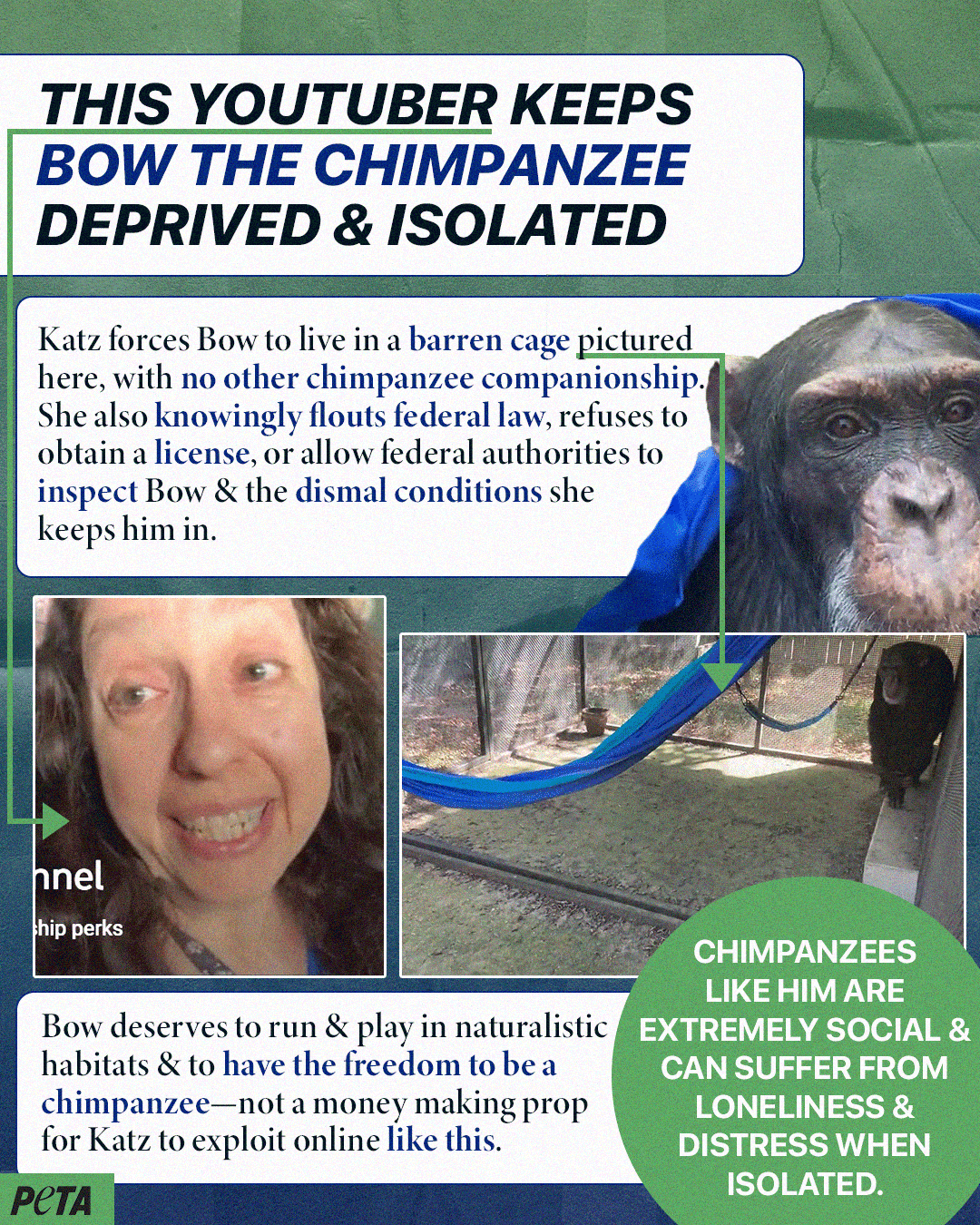
Bow was born in 2002, and when he was only 1 month old, he was taken from his mother and sent to live in the home of Aya Katz, where he remains today—without ever having shared the company of another chimpanzee. In the wild, male chimpanzees are mama’s boys and never leave the group they were born into. Since Bow has been denied the fulfillment of his every natural instinct for his whole life, he deserves to have the opportunity to satisfy those instincts in an accredited sanctuary.
PETA is offering a $10,000 reward for evidence that results in the confiscation by law-enforcement authorities of Bow the chimpanzee from the custody of Aya Katz. Anyone with information can report tips using this web form.
Take action for Bow using the form at the bottom of this page.
Please also ask your members of Congress to cosponsor a crucial bill that would protect wild animals and safeguard the public by prohibiting anyone from buying primates to keep as “pets” in human homes. This action is limited to residents of the U.S.

Ricky
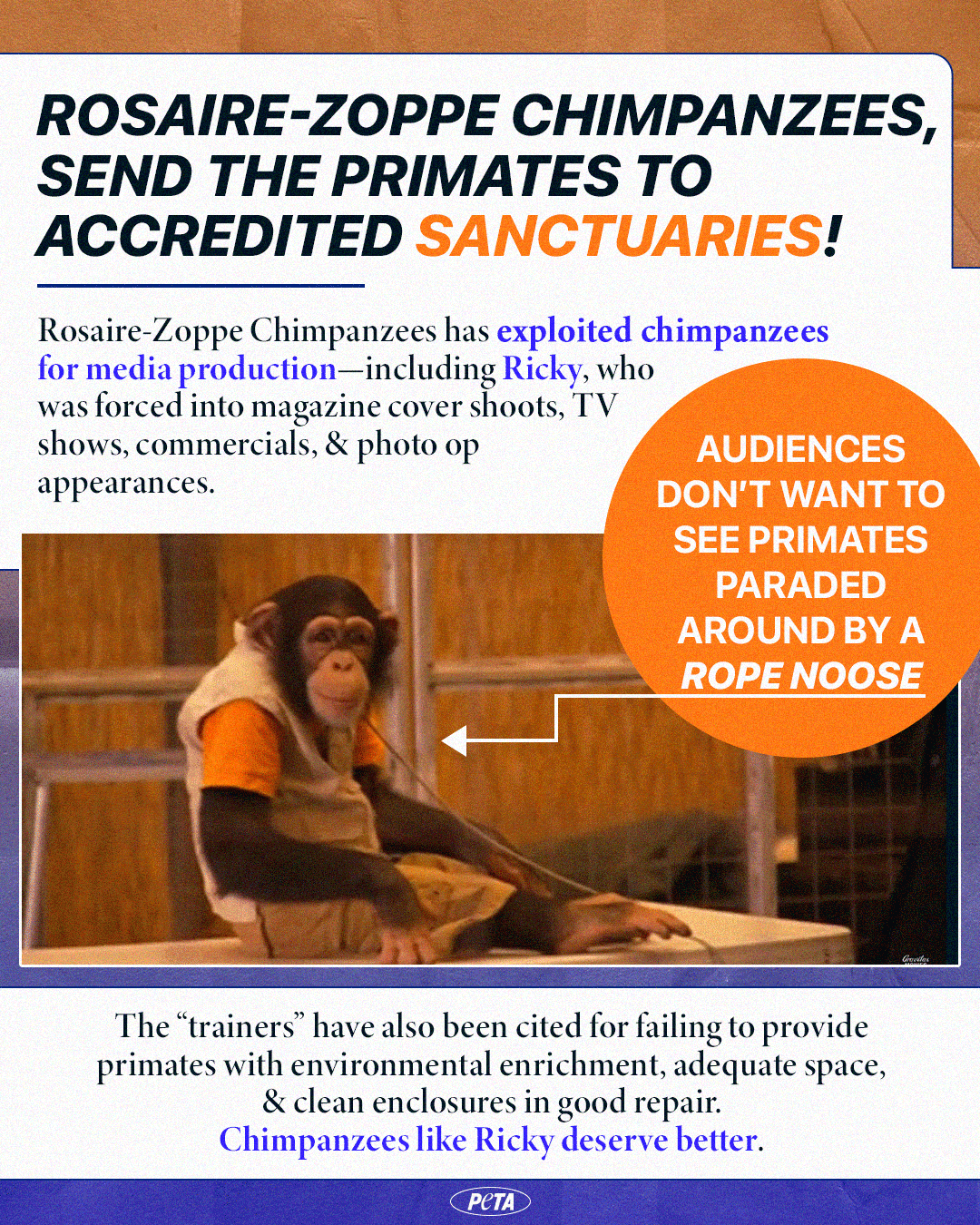
The Rosaire-Zoppe family spent decades forcing chimpanzees to perform in degrading circus acts, where they were yanked by rope nooses around their necks and compelled to do backflips on horses who galloped in circles on stage. Young chimpanzees like Ricky were also exploited for media productions—something Hollywood has shunned completely with the public’s greater understanding that great apes are individuals, not wind-up toys for human amusement. Ricky and the other chimpanzees relegated to cages after years of performing deserve to live in spacious habitats at accredited sanctuaries.
PETA is offering a $10,000 reward for evidence that results in the confiscation by law-enforcement authorities of Ricky and the two other chimpanzees held captive at Pam Rosaire’s secretive compound in Sarasota.
Anyone with information can report tips using this web form.
Sugriva
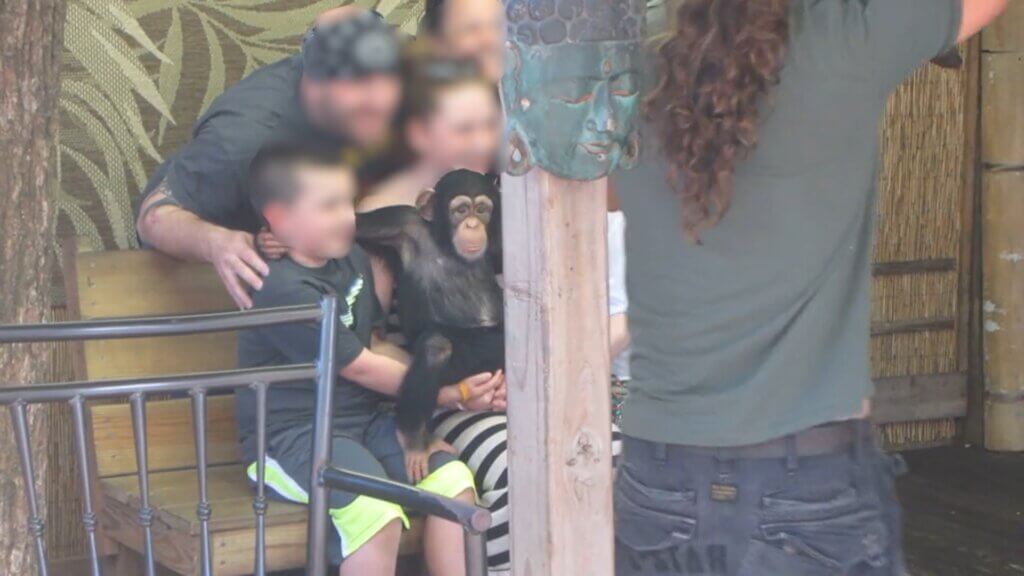
Myrtle Beach Safari has long been run by Tiger King villain Bhagavan “Doc” Antle and his associates. He has been convicted of felony wildlife trafficking in the state of Virginia and pleaded guilty to a federal charge of conspiracy to violate the Lacey Act (a wildlife protection law)—including for purchasing a young chimpanzee for $200,000. He has a history of acquiring baby chimpanzees, such as Sugriva, to exploit for lucrative photo ops. Antle, his children, and his partners share photos and videos of themselves alongside Sugriva and other chimpanzees on social media on a daily basis—which studies have shown is harmful to conservation and misleads people into thinking that chimpanzees make good “pets.” It’s time to close the curtain on this cruelty for good, and for Sugriva and the other chimpanzees at Myrtle Beach Safari to be moved to accredited sanctuaries.
Send a message to Myrtle Beach Safari using the form at the bottom of this page.

Magillan
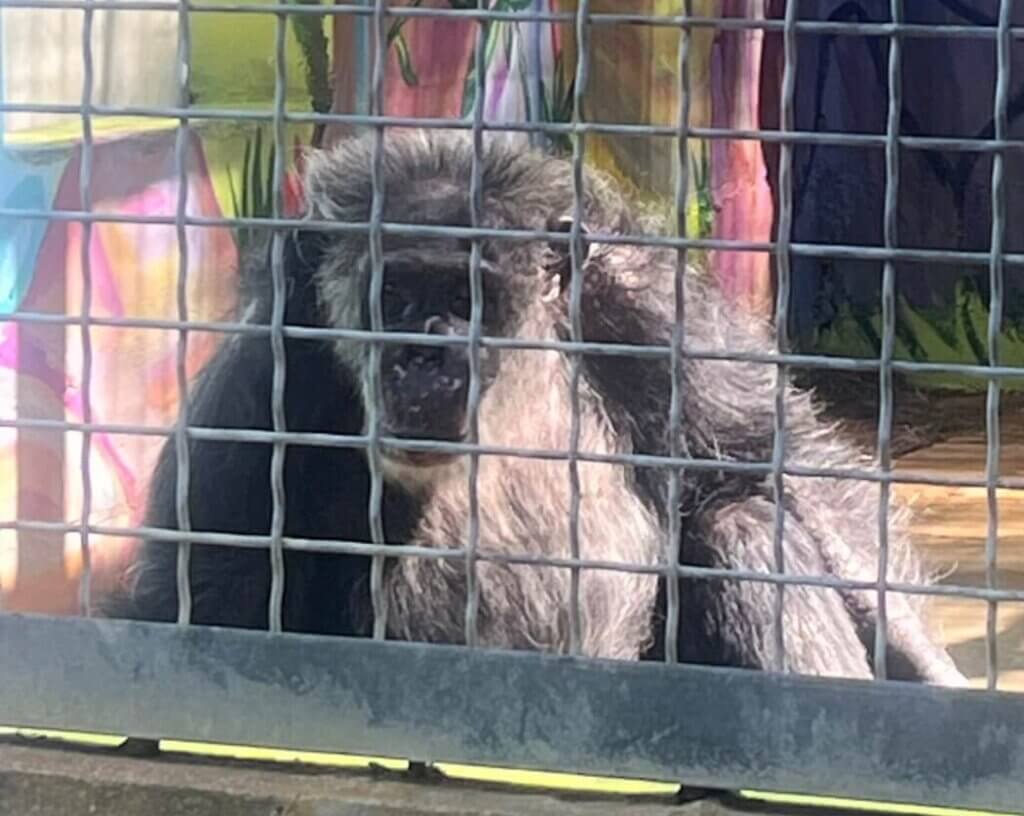
Don’t be duped by its name—Suncoast Primate Sanctuary is anything but a legitimate sanctuary. It confines primates to small concrete cells and forces many of them to live separated from one another, even though all primates are extremely social. A true sanctuary would never purposefully breed primates, but Suncoast has repeatedly bred its chimpanzee residents, only to have more infants born into lives of deprivation. One of the elder chimpanzees confined to this roadside zoo, Magillan, is the father of four other chimpanzees held there. An exposé into the insurmountable financial issues with this facility stated that “in his 50 years at Suncoast, Magillan has never lived with grass beneath his feet.” Magillan, his four offspring, and all the other chimpanzees at Suncoast deserve to feel soft ground and explore and climb through spacious habitats at accredited sanctuaries.
Petunia
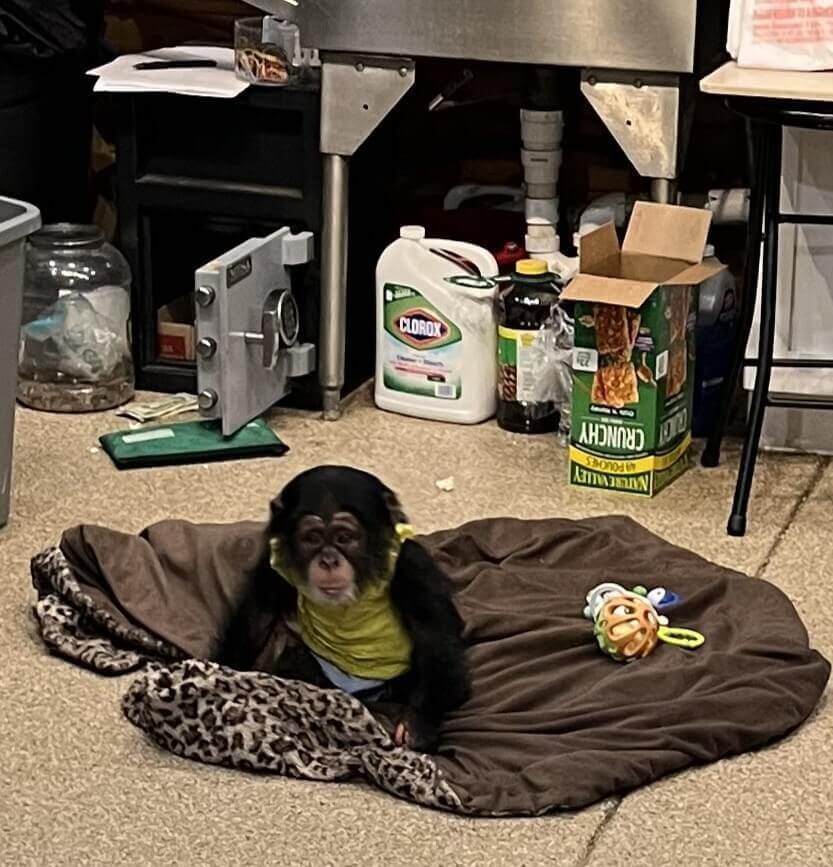
Hovatter’s Wildlife Zoo has a history of exploiting baby chimpanzees for public encounters and then relegating them to small, barren enclosures. According to government records, one chimpanzee, Petunia, was acquired in 2023 when she was only 10 days old. Removing chimpanzees from their mothers as infants is extremely traumatic for both the mother and baby, but it’s business as usual for roadside zoos like Hovatter’s. The facility has been cited by the USDA for failing to provide adequate environmental enrichment to chimpanzees, including failing to address the special needs of infants and juveniles. Petunia and the other chimpanzees confined to this hellhole deserve to live in an accredited sanctuary where they could have the opportunity to express natural chimpanzee behavior and have fulfilling, enriched lives.

Louie
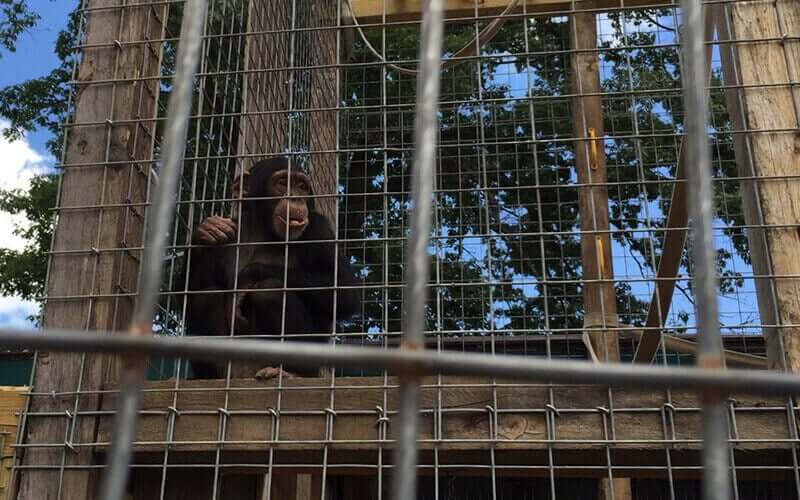
When Louie was only 6 weeks old, he was shipped to the Upper Peninsula of Michigan to live at the decrepit DeYoung Family Zoo, where he was passed around for public encounters for the first couple years of his life. Later, he was kept in a small cage—all alone—where visitors repeatedly saw him exhibiting signs of frustration and distress. DeYoung started acquiring more chimpanzees when Louie was about 5 years old, but the most recent records available to PETA indicate that he was not socialized, likely because the roadside zoo isn’t equipped with the facilities necessary for proper introductions between chimpanzees. DeYoung has confined chimpanzees in a closed-off building, so it’s unclear whether Louie has any companionship with others of his kind at all. During the severe Upper Peninsula winters, it’s likely that the chimpanzees are forced to live in the indoor space day after day. Louie and the others kept at this roadside zoo deserve to live at accredited sanctuaries where they could explore naturalistic habitats year-round.
Take Rapid Action for Chimpanzees
There are multiple opportunities to help. Just enter your information once and then keep clicking the “Send Message” button until you’ve completed all the action alerts. Once you’ve finished, be sure to share this page with your friends, family members, and social media followers. Ask them to join you in taking action for chimpanzees suffering in human homes or roadside zoos.